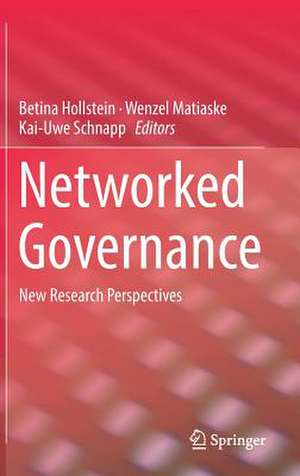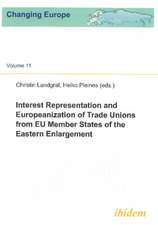Networked Governance: New Research Perspectives
Editat de Betina Hollstein, Wenzel Matiaske, Kai-Uwe Schnappen Limba Engleză Hardback – 7 apr 2017
| Toate formatele și edițiile | Preț | Express |
|---|---|---|
| Paperback (1) | 695.85 lei 6-8 săpt. | |
| Springer International Publishing – 8 mai 2018 | 695.85 lei 6-8 săpt. | |
| Hardback (1) | 702.05 lei 6-8 săpt. | |
| Springer International Publishing – 7 apr 2017 | 702.05 lei 6-8 săpt. |
Preț: 702.05 lei
Preț vechi: 825.94 lei
-15% Nou
Puncte Express: 1053
Preț estimativ în valută:
134.33€ • 140.66$ • 111.42£
134.33€ • 140.66$ • 111.42£
Carte tipărită la comandă
Livrare economică 09-23 aprilie
Preluare comenzi: 021 569.72.76
Specificații
ISBN-13: 9783319503844
ISBN-10: 3319503847
Pagini: 302
Ilustrații: VI, 269 p. 43 illus., 12 illus. in color.
Dimensiuni: 155 x 235 x 18 mm
Greutate: 0.56 kg
Ediția:1st ed. 2017
Editura: Springer International Publishing
Colecția Springer
Locul publicării:Cham, Switzerland
ISBN-10: 3319503847
Pagini: 302
Ilustrații: VI, 269 p. 43 illus., 12 illus. in color.
Dimensiuni: 155 x 235 x 18 mm
Greutate: 0.56 kg
Ediția:1st ed. 2017
Editura: Springer International Publishing
Colecția Springer
Locul publicării:Cham, Switzerland
Cuprins
Introduction: Networked Governance: Taking Networks Seriously.- Part I: Networked Governance: General Issues.- Part II: Types, Processes and Limits of Networked Governance.- Part III: Investigating Networked Governance: Methodological Approaches.- Part IV: Conclusions.
Notă biografică
Prof. Dr. Betina Hollstein studied sociology at Philipps Universität Marburg and at the Free University, Berlin. She received her doctorate degree at the Free University, Berlin. Hollstein has been lecturer and researcher at the Universities in Berlin (Free University, Humboldt University), Munich and Mannheim, before she was appointed as professor of sociology at the University of Hamburg. Currently Betina Hollstein is professor of sociology at the University of Bremen. She is acting director of the SOCIUM - Research Center on Inequality and Social Policy at the University of Bremen. Besides, she is a member of the executive board of the German Sociological Association and a member of the board of directors of the International Network for Social Network Analysis (INSNA). Her research interests include social networks, sociology of the life-course, social inequality, and methods of empirical social research.
Prof. Dr. Wenzel Matiaske studied Sociology, Political Science, and Economics at Philipps Universität Marburg and Public Administration at the German University of Administration Sciences Speyer. He worked as Research Assistant at the Universities of Paderborn and Mainz and held positions as Assistent Professor (1991-1998, Technische Universität Berlin), Acting Professor (1998-2000, University of Paderborg) and Full Professor of Business Administration at the International Institute for Management of Flensburg University (2000-2008). He is currently Professor at Helmut-Schmidt-University / University of the Federal Armed Forces, Hamburg. Furthermore, he is associated as Research Professor with the German Socio-Economic Panel Study (SOEP) at the German Institute for Economic Research (DIW), Berlin.
Prof. Dr. Kai-Uwe Schnapp studied Political Science and Public Administration in Berlin and Minneapolis. He worked as Junior Research Fellow at the Social Science Research Center Berlin(WZB) and as postdoctoral researcher at the Otto-Friedrich-University Bamberg and the Martin-Luther-University Halle-Wittenberg. He currently is Professor for Political Science, especially Research Methodology at the University of Hamburg.
Prof. Dr. Wenzel Matiaske studied Sociology, Political Science, and Economics at Philipps Universität Marburg and Public Administration at the German University of Administration Sciences Speyer. He worked as Research Assistant at the Universities of Paderborn and Mainz and held positions as Assistent Professor (1991-1998, Technische Universität Berlin), Acting Professor (1998-2000, University of Paderborg) and Full Professor of Business Administration at the International Institute for Management of Flensburg University (2000-2008). He is currently Professor at Helmut-Schmidt-University / University of the Federal Armed Forces, Hamburg. Furthermore, he is associated as Research Professor with the German Socio-Economic Panel Study (SOEP) at the German Institute for Economic Research (DIW), Berlin.
Prof. Dr. Kai-Uwe Schnapp studied Political Science and Public Administration in Berlin and Minneapolis. He worked as Junior Research Fellow at the Social Science Research Center Berlin(WZB) and as postdoctoral researcher at the Otto-Friedrich-University Bamberg and the Martin-Luther-University Halle-Wittenberg. He currently is Professor for Political Science, especially Research Methodology at the University of Hamburg.
Textul de pe ultima copertă
This edited volume seeks to explore established as well as emergent forms of governance by combining social network analysis and governance research. In doing so, contributions take into account the increasingly complex forms which governance faces, consisting of different types of actors (e.g. individuals, states, economic entities, NGOs, IGOs), instruments (e.g. law, suggestions, flexible norms) and arenas from the local up to the global level, and which more and more questions theoretical models that have focused primarily on markets and hierarchies. The topics addressed in this volume are processes of coordination, arriving at and implementing decisions taking place in network(ed) (social) structures; such as governance of work relations, of financial markets, of innovation and politics. These processes are investigated and discussed from sociologists’, political scientists’ and economists’ viewpoints.
Caracteristici
Combines governance research and network analysis, two previously separated fields of research Contributes to the contemporary debate on organizing and steering public and private organizations and institutions Features some of the most prominent authors in the field
















